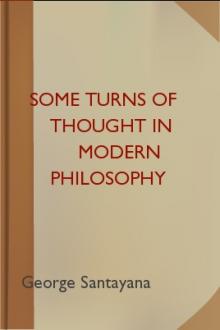Some Turns of Thought in Modern Philosophy, George Santayana [if you liked this book .TXT] 📗

- Author: George Santayana
- Performer: -
Book online «Some Turns of Thought in Modern Philosophy, George Santayana [if you liked this book .TXT] 📗». Author George Santayana
All modern philosophy, in so far as it is a description of experience and not of nature, therefore seems to belong to the sphere of literature, and to be without scientific value.
II FIFTY YEARS OF BRITISH IDEALISM[10]After fifty years, an old milestone in the path of philosophy, Bradley's Ethical Studies, has been set up again, as if to mark the distance which English opinion has traversed in the interval. It has passed from insular dogmatism to universal bewilderment; and a chief agent in the change has been Bradley himself, with his scornful and delicate intellect, his wit, his candour, his persistence, and the baffling futility of his conclusions. In this early book we see him coming forth like a young David against every clumsy champion of utilitarianism, hedonism, positivism, or empiricism. And how smooth and polished were the little stones in his sling! How fatally they would have lodged in the forehead of that composite monster, if only it had had a forehead! Some of them might even have done murderous execution in Bradley's own camp: for instance, this pebble cast playfully at the metaphysical idol called "Law": "It is always wet on half-holidays because of the Law of Raininess, but sometimes it is not wet, because of the Supplementary Law of Sunshine".
Bradley and his friends achieved a notable victory in the academic field: philosophic authority and influence passed largely into their hands in all English-speaking universities. But it was not exactly from these seats of learning that naturalism and utilitarianism needed to be dislodged; like the corresponding radicalisms of our day, these doctrines prevailed rather in certain political and intellectual circles outside, consciously revolutionary and often half-educated; and I am afraid that the braggart Goliaths of today need chastening at least as much as those of fifty years ago. In a country officially Christian, and especially in Oxford, it is natural and fitting that academic authority should belong to orthodox tradition—theological, Platonic, and Aristotelian. Bradley, save for a few learned quotations, strangely ignored this orthodoxy entrenched behind his back. In contrast with it he was himself a heretic, with first principles devastating every settled belief: and it was really this venerable silent partner at home that his victory superseded, at least in appearance and for a season. David did not slay Goliath, but he dethroned Saul. Saul was indeed already under a cloud, and all in David's heart was not unkindness in that direction. Bradley might almost be called an unbelieving Newman; time, especially, seems to have brought his suffering and refined spirit into greater sympathy with ancient sanctities. Originally, for instance, venting the hearty Protestant sentiment that only the Christianity of laymen is sound, he had written: "I am happy to say that 'religieux' has no English equivalent". But a later note says: "This is not true except of Modern English only. And, in any case, it won't do, and was wrong and due to ignorance. However secluded the religious life, it may be practical indirectly if through the unity of the spiritual body it can be taken as vicarious". The "if" here saves the principle that all values must be social, and that the social organism is the sole moral reality: yet how near this bubble comes to being pricked! We seem clearly to feel that the question is not whether spiritual life subserves animal society, but whether animal society ever is stirred and hallowed into spiritual life.
All this, however, in that age of progress, was regarded as obsolete: there was no longer to be any spirit except the spirit of the times. True, the ritualists might be striving to revive the latent energies of religious devotion, with some dubious help from aestheticism: but against the rising tide of mechanical progress and romantic anarchy, and against the mania for rewriting history, traditional philosophy then seemed helpless and afraid to defend itself: it is only now beginning to recover its intellectual courage. For the moment, speculative radicals saw light in a different quarter. German idealism was nothing if not self-confident; it was relatively new; it was encyclopaedic in its display of knowledge, which it could manipulate dialectically with dazzling, if not stable, results; it was Protestant in temper and autonomous in principle; and altogether it seemed a sovereign and providential means of suddenly turning the tables on the threatened naturalism. By developing romantic intuition from within and packing all knowledge into one picture, the universe might be shown to be, like intuition itself, thoroughly spiritual, personal, and subjective.
The fundamental axiom of the new logic was that the only possible reality was consciousness.
"People find", writes Bradley, "a subject and an object correlated in consciousness.... To go out of that unity is for us literally to go out of our minds.... When mind is made only a part of the whole, there is a question which must be answered.... If about any matter we know nothing whatsoever, can we say anything about it? Can we even say that it is? And if it is not in consciousness, how can we know it?... And conversely, if we know it, it cannot be not mind."
Bradley challenged his contemporaries to refute this argument; and not being able to do so, many of them felt constrained to accept it, perhaps not without grave misgivings. For was it not always a rooted conviction of the British mind that knowledge brings material power, and that any figments of consciousness (in religion, for instance) not bringing material power are dangerous bewitchments, and not properly knowledge? Yet it is no less characteristic of the British mind to yield occasionally, up to a certain point, to some such enthusiastic fancy, provided that its incompatibility with honest action may be denied or ignored. So in this case British idealists, in the act of defining knowledge idealistically, as the presence to consciousness of its own phenomena, never really ceased to assume transcendent knowledge of a self-existing world, social and psychological, if not material: and they continued scrupulously to readjust their ideas to those dark facts, often more faithfully than the avowed positivists or scientific psychologists.
What could ethics properly be to a philosopher who on principle might not trespass beyond the limits of consciousness? Only ethical sentiment. Bradley was satisfied to appeal to the moral consciousness of his day, without seeking to transform it. The most intentionally eloquent passage in his book describes war-fever unifying and carrying away a whole people: that was the summit of moral consciousness and of mystic virtue. His aim, even in ethics, was avowedly to describe that which exists, to describe moral experience, without proposing a different form for it. A man must be a man of his own time, or nothing; to set up to be better than the world was the beginning of immorality; and virtue lay in accepting one's station and its duties. The moralist should fill his mind with a concrete picture of the task and standards of his age and nation, and should graft his own ideals upon that tree; this need not prevent moral consciousness from including a decided esteem for non-political excellences like health, beauty, or intelligence, which are not ordinarily called virtues by modern moralists. Yet they were undeniably good; better, perhaps, than any painful and laborious dutifulness; so that the strictly moral consciousness might run over, and presently lose itself in "something higher". Indeed, even health, beauty, and intelligence, which seemed at first so clearly good, might lose their sharpness on a wider view. In the panorama that would ultimately fill the mind these so-called goods and virtues could not be conceived without their complementary vices and evils. Thus all moral consciousness, and even all vital preference might ultimately be superseded: they might appear to have belonged to a partial and rather low stage in the self-development of consciousness.
With this dissolution of his moral judgments always in prospect, why should Bradley, or any idealist, have pursued ethical studies at all? Since all phases of life were equally necessary to enrich an infinite consciousness, which must know both good and evil in order to merge and to transcend them, he could hardly nurse any intense enthusiasm for a different complexion to be given to the lives of men. His moral passion—for he had it, caustic and burning clear—was purely intellectual: it was shame that in England the moral consciousness should have been expressed in systems dialectically so primitive as those of the positivists and utilitarians. He acknowledged, somewhat superciliously, that their hearts were in the right place; yet, if we are to have ethics at all, were not their thoughts in the right place also? They were concerned not with analysis of the moral consciousness but with the conduct of affairs and the reform of institutions. The spectacle of human wretchedness profoundly moved them; their minds were bent on transforming society, so that a man's station and its duties might cease to be what a decayed feudal organisation and an inhuman industrialism had made of them. They revolted against the miserable condition of the masses of mankind, and against the miserable consolations which official religion, or a philosophy like Bradley's, offered them in their misery. The utilitarians were at least intent on existence and on the course of events; they wished to transform institutions to fit human nature better, and to educate human nature by those new institutions so that it might better realise its latent capacities. These are matters which a man may modify by his acts and they are therefore the proper concern of the moralist. Were they much to blame if they neglected to define pleasure or happiness and used catch-words, dialectically vague, to indicate a direction of effort politically quite unmistakable? Doubtless their political action, like their philosophical nomenclature, was revolutionary and relied too much on wayward feelings ignorant of their own causes. Revolution, no less than tradition, is but a casual and clumsy expression of human nature in contact with circumstances; yet pain and pleasure and spontaneous hopes, however foolish, are direct expressions of that contact, and speak for the soul; whereas a man's station and its duties are purely conventional, and may altogether misrepresent his native capacities. The protest of human nature against the world and its oppressions is the strong side of every rebellion; it was the moral side of utilitarianism, of the rebellion against irrational morality.
Unfortunately the English reformers were themselves idealists of a sort, entangled in the vehicles of perception, and talking about sensations and ideas, pleasures and pains, as if these had been the elements of human nature, or even of nature at large: and only the most meagre of verbal systems, and the most artificial, can be constructed out of such materials. Moreover, they spoke much of pleasure and happiness, and hardly at all of misery and pain: whereas it would have been wiser, and truer to their real inspiration, to have laid all the emphasis on evils to be abated, leaving the good to shape itself in freedom. Suffering is the instant and obvious sign of some outrage done to human nature; without this natural recoil, actual or imminent, no morality would have any sanction, and no precept could be imperative. What silliness to command me to pursue pleasure or to avoid it, if in any case everything would be well! Save for some shadow of dire repentance looming in the distance, I am deeply free to walk as I will.





Comments (0)